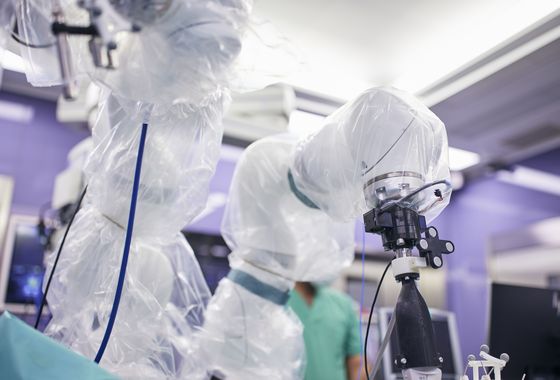Surgeons use all their senses and draw on their experience during complex operations. When they don’t have a clear view of a patient’s anatomy, they use tactile senses to assess the situation or listen for acoustic clues to determine, for example, when they should stop drilling. Surgical robots, however, lack these human abilities and nuanced senses, which significantly limits their range of use. Similar to an autopilot, these robots follow a predefined path based only on medical imaging. If the predefined path does not accurately reflect the actual circumstances, the systems lack the necessary non-visual sensory perception needed to adapt, requiring the surgeon to take over again. Such challenges often arise during complex operations that demand high precision. These include, for example, spinal fusions where multiple screws must be inserted in close proximity to vital structures with millimeter precision.
An international research cooperation including Balgrist University Hospital and the University of Zurich set an ambitious goal in this regard: developing surgical robots capable of autonomously performing complex and highly precise surgical tasks using a range of sensory perceptions mimicking human senses. The robots learn how to scan, touch, hear, feel and interpret the tissue, enabling them to respond accurately.
Since 2021, the research consortium has been working on the FAROS project as part of the prestigious Horizon 2020 research program. FAROS stands for Functionally Accurate RObotic Surgery.
At Balgrist, patients are at the center of everything we do. A large part of our research is driven by the challenges we encounter in everyday clinical work. This is exactly where FAROS comes into play: the robot is equipped with the necessary tools to understand clinical or surgical situations and proceed accordingly,” explained Prof. Mazda Farshad, Medical Director Balgrist University Hospital.
The results are promising
After three intense years and eight joint integration weeks, the final robotic prototype was tested at the Balgrist OR-X research and training center. The new robotic parts were flown in from all over Europe, assembled in Zurich and validated in ex-vivo experiments. Prof. Philipp Fürnstahl, who was the Swiss principal investigator in the FAROS project, explained: “Our new approach required us to start the research process from scratch. Now, we have an intelligent, robotic system capable of autonomously performing surgical steps in a controlled environment. That’s fantastic.”
The validation results underpin the great potential of the non-visual sensory technology. “The precision of the first prototype is very promising. We’ll soon be in a range that is clinically acceptable,” continued Fürnstahl.
A prime example of international research work
A research project of this scale requires significant expertise and coordination. The collaboration between the universities and industry partners was particularly important. The Swiss team served as central hubs between the areas of robotics (Sorbonne University, France), computer science (King's College London, England), sensory technology (KU Leuven, Belgium) and industry (SpineGuard, France).
Balgrist University Hospital and University of Zurich complemented the consortium with their clinical expertise and professional research infrastructure – the Operating Room X (OR-X). Prof. Reto Sutter, Head of Radiology at Balgrist, also worked alongside with Mazda Farshad and Philipp Fürnstahl.
“It was very pleasing to see how professional and focused the collaboration with our international colleagues was over the years,” explained Mazda Farshad.
FAROS: an EU Horizon project
FAROS was supported by the EU’s Horizon 2020 research and innovation program. With total funding of almost 80 billion euros and a duration of seven years, Horizon 2020 was the largest research and innovation program in the EU.
UKB captured the end of the FAROS project on film. The video can be found on Youtube.
Useful links:
- FAROS - Multisensorische Robotik
- FAROS project website
- Position papier from Swiss Medtech on promoting the use of robotic assistance systems in surgery
Contact for further Information
Gregor Lüthy, Head of Communication
Balgrist University Hospital
+41 44 386 14 15
e-mail

